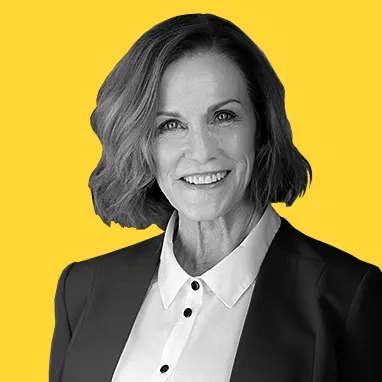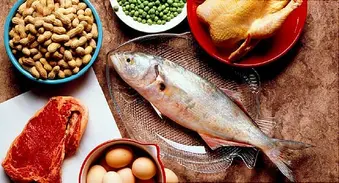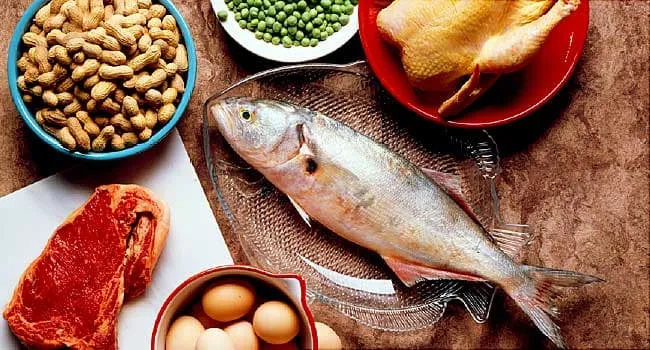Quiz: Myths and Facts About Protein


Men need more protein than women.
- True
- False
How much protein you need depends on your sex, age, how much you weigh, how active you are, and other things. But yes, guys usually need more protein than women. An average man needs about 56 grams of protein a day. Women need 46 grams. A typical day with about 50 grams of protein could include: Chicken (3 ounces), two large eggs, 2 tablespoons of peanut butter, and 8 ounces of yogurt.
How many of your calories should come from protein?
- 5% to 10%
- 10% to 35%
- 35% to 50%
- 50% to 65%
If you're like most Americans, you get all the protein you need. You should usually get about 10% to 35% of your calories from protein every day.
Athletes need more protein than couch potatoes.
- True
- False
How active you are affects how much protein your body needs. Athletes may need slightly more protein than non-athletes. They need it to repair and rebuild muscles after all that work.
Which has more protein?
- 1 cup of whole milk
- 1 cup of vegetarian baked beans
- 3 ounces of beef
- 1 large egg
All of these are good sources of protein, but beef and other meats are really protein-packed. Meat is also high in saturated fat, which can lead to high cholesterol and heart disease. If you choose red meats for protein, stick with the leanest cuts and be smart with portion sizes. To reduce your risk of cancer, the American Institute of Cancer Research recommends limiting red meat to 18 ounces a week and skipping processed meats like bacon, sausage, and lunchmeat.
Why do we need protein?
- For energy
- To build cells
- To repair bones and muscles
- All of the above
Protein is an important part of every cell in your body. It has many jobs including giving you energy, repairing your bones and muscles, building cells, and helping with your immune system.
A high-protein diet can help you lose weight.
- True
- False
Some studies show that replacing protein for carbs may help you lose weight. High-protein foods move more slowly through your digestive system. That helps you feel full longer after you eat. And your body burns more calories digesting protein than digesting carbs. Protein also can help you avoid hunger pangs by keeping your blood sugar levels steady. But don't rush out and eat steak all day. Expert say we still don't know the long-term effects of a high-protein, low-carb diet.
Too much protein can be unhealthy.
- True
- False
Usually, it's not a big deal to eat more protein than you need. But eating more protein means more calories, which can lead to weight gain. And if the protein is from meat or other animal sources, it might be high in saturated fat, which can lead to high cholesterol and heart disease. Too much protein can also cause problems if you have medical conditions, such as kidney disease or diabetes.
A "complete" protein is also known as:
- A carbohydrate protein
- A high-quality protein
- A special protein
Complete, or high-quality proteins, are packed with specific amino acids. Amino acids are the building blocks of proteins. There are about 20 different ones. Your body needs them all but can only make some. The rest have to come from your diet. Those are known as "essential" amino acids. Complete proteins, like eggs, cheese, meat, soy, and quinoa, have all nine essential amino acids."Incomplete" protein sources are low in one or more essential amino acids. But you can still get all the amino acids you need even by eating a variety of incomplete protein sources.
Women shouldn't have soy protein.
- True
- False
Some women worry about plant-made estrogens found in soy. The American Cancer Society says there are no known dangers to eating soy. Eating soy may even lower the risk of breast cancer. Experts say soy protein is a good low-fat option instead of high-fat, animal-based proteins like red meat. Soy comes from soybeans. You can find it in soy milk, tempeh, edamame, and tofu. Whole soy gives you all the essential amino acids, just like protein from animal sources. It is also used instead of meat in some vegetarian dishes.
Our bodies are good at storing protein to use later.
- True
- False
Our bodies don't store proteins the way they store carbs and fats. That's why you need a steady supply of protein every day.
You can help build muscle by eating protein right after a workout.
- True
- False
Protein can help repair muscles after working out. Many studies show that having high-protein foods or drinks soon after exercise helps build and restore muscle. But protein is only part of the story. The other key nutrient to strengthen muscles is carbohydrates.
Whey protein is high in fat.
- True
- False
One reason people like whey protein is because it’s low in fat. Whey has proteins that are easy to digest. Some studies show that whey protein may also be good for your immune system.
Which of these are in the USDA’s MyPlate protein food group?
- Seeds
- Nuts
- Beans and peas
- All of the above
The USDA’s MyPlate program includes as protein all foods from meat, poultry, seafood, beans and peas, eggs, processed soy products, nuts, and seeds. Beans and peas are also part of the vegetable group.
Most Americans don't eat enough protein.
- True
- False
Most Americans get all the protein they need from their diet. In fact, most of us get more than enough. Even vegetarians can get plenty of protein by eating a variety of plant-based proteins. Soy and quinoa are particularly good sources because they have all the amino acids, the building blocks of protein, that you need. Older adults need to make sure they get enough protein, because it can be easy to lose muscle as we get older.
You can find protein in which of the following:
- Sunflower seeds
- Walnuts
- Chickpeas
- All the above
Protein comes in all kinds of interesting foods. You can find it in meat, of course. But you can also get protein from nuts and seeds, beans and peas, and eggs.
Which could mean you're not getting enough protein?
- Weight loss
- Muscle fatigue
- Loss in muscle strength
- All of the above
Most people don't need to worry about eating enough protein. But strict vegetarians, vegans, and older people should know the signs of too little protein. These include recent weight loss, tired muscles, and a drop in your muscle strength.
A high-quality protein diet can help lower your chance of heart disease.
- True
- False
Most Americans get about 12% to 18% of their calories from protein. To be healthier, eat more fish, chicken, beans, and less red meat. Also, swap your refined carbs for these healthier proteins. That means more protein instead of foods like white bread and white rice.
